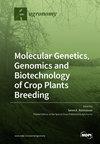利用高吸水性聚合物缓解干旱胁迫对沙质土壤大麦和胡芦巴种子发芽的影响
IF 3.3
2区 农林科学
Q1 AGRONOMY
引用次数: 0
摘要
水分亏缺是影响种子作物发芽和产量的主要限制因素之一。因此,超吸收性聚合物(SAP)是提高水分利用效率的几种技术之一,可使种子发芽。本研究的目的是在随机完全区组设计中使用三个重复,研究三种SAP(0.0%、0.5%和1.0%w/w)对在沙质土壤中播种的大麦和胡芦巴幼苗出苗的潜在影响。户外盆栽实验在埃及阿斯旺省进行。两种作物种子的最终发芽率(FGPs)差异不显著,而施用SAP提高了幼苗发芽指数(GI),两种作物的种子差异显著。施用0.5%的SAP对大麦(2.47天-1)和胡芦巴(2.66天-1)种子的GI最高。S型函数有效地描述了在R2大于0.992的SAP水平下,两种种子的累积发芽率作为时间的函数。在SAP为0.5%时,大麦和胡芦巴种子的最大发芽率分别为69.4和64.6天-1。0.0%SAP的相应发生率分别为11天和12天-1。大麦的水分发芽效率(WGE)分别为27.76和30.04 cm−1(分别为0.0%和0.5%SAP),胡芦巴的水分发芽率分别为23.07和29.9 cm−1。因此,SAPs可以代表一种很有前途的解决方案,用于提高砂土中种子发芽的保湿性。对于战略管理,大麦被建议在半干燥的土壤中生长在胡芦巴上。本文章由计算机程序翻译,如有差异,请以英文原文为准。
Alleviation of Water-Deficit Stress on Seed Germination of Barley and Fenugreek in a Sandy Soil Using Superabsorbent Polymer
Water deficit is one of the major limiting factors of seed crop germination and productivity. Consequently, superabsorbent polymers (SAPs) are among several technologies that enhance water use efficiency, leading to worthy seed germination. The objective of this study was to investigate the potential effect of three rates of SAPs (0.0%, 0.5%, and 1.0% w/w) on the seedling emergence of barley and fenugreek sown in a sandy soil using three replicates in a randomized complete block design. Outdoor pot experiments were conducted in Aswan Province, Egypt. The differences in the final germination percentages (FGPs) were not significant for both seeds, while the application of SAPs enhanced the seedling germination index (GI) with significant differences for both crop seeds. The application of SAP at 0.5% gave the highest GI for barley (2.47 day−1) and fenugreek (2.66 day−1) seeds. The sigmoidal function effectively described the cumulative germination percentage rates for both seeds as a function of time under the SAP levels with R2 greater than 0.992. The maximum rates were 69.4 and 64.6 day−1 for barley and fenugreek seeds at SAP 0.5%, respectively. The corresponding rates for 0.0% SAP were 11 and 12 day−1. The water germination efficiencies (WGE) were 27.76 and 30.04 cm−1 for 0.0% and 0.5% SAP for barley, while they were 23.07 and 29.9 cm−1 for fenugreek. Accordingly, SAPs could represent a promising solution for increasing moisture conservation for seed germination in a sand soil. For strategic management, barley is recommended for growth over fenugreek in a semidried soil.
求助全文
通过发布文献求助,成功后即可免费获取论文全文。
去求助
来源期刊

Agronomy-Basel
Agricultural and Biological Sciences-Agronomy and Crop Science
CiteScore
6.20
自引率
13.50%
发文量
2665
审稿时长
20.32 days
期刊介绍:
Agronomy (ISSN 2073-4395) is an international and cross-disciplinary scholarly journal on agronomy and agroecology. It publishes reviews, regular research papers, communications and short notes, and there is no restriction on the length of the papers. Our aim is to encourage scientists to publish their experimental and theoretical research in as much detail as possible. Full experimental and/or methodical details must be provided for research articles.
 求助内容:
求助内容: 应助结果提醒方式:
应助结果提醒方式:


